Intro
Identify common cold symptoms, including runny nose, cough, and fatigue, and learn about flu-like symptoms, sinus pressure, and congestion to determine if you have a cold or another illness, and discover remedies for relief.
The common cold is a viral infection that affects millions of people worldwide every year. It is a highly contagious illness that can spread quickly through the air, close contact with an infected person, or by touching contaminated surfaces. The cold virus can cause a range of symptoms, from mild to severe, and can affect anyone, regardless of their age or health status. In this article, we will explore the common signs of a cold, its causes, symptoms, and treatment options.
The common cold is often mistaken for other respiratory illnesses, such as the flu or bronchitis. However, it is essential to recognize the signs and symptoms of a cold to seek proper treatment and prevent complications. A cold can be a nuisance, but it can also lead to more severe health issues, such as sinus infections, ear infections, or pneumonia, especially in people with weakened immune systems.
Colds are caused by viruses, such as rhinoviruses, coronaviruses, and adenoviruses, which can spread quickly through the air or by close contact with an infected person. When an infected person talks, coughs, or sneezes, they release tiny droplets that contain the virus, which can then be inhaled by others. The virus can also survive on surfaces, such as doorknobs, keyboards, and countertops, for several hours, making it easy to pick up the infection.
What Are The Common Signs Of A Cold
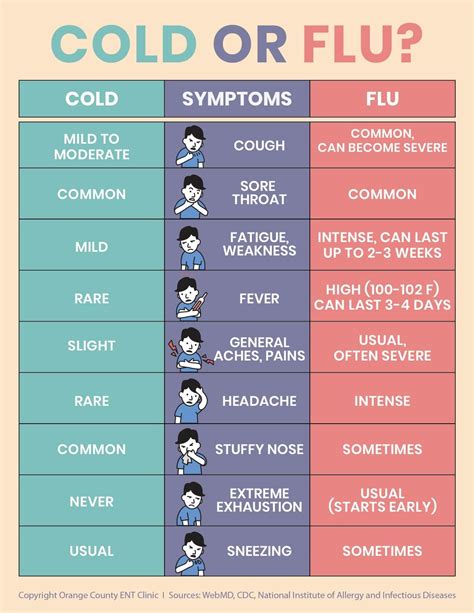
The common signs of a cold can vary from person to person, but they often include a runny nose, congestion, sneezing, coughing, and a sore throat. Other symptoms may include a headache, fatigue, and a general feeling of being unwell. In some cases, a cold can also cause a fever, especially in children. It is essential to recognize these symptoms early on to seek proper treatment and prevent complications.
Causes Of A Cold
The causes of a cold are often linked to viral infections, but other factors can contribute to the development of the illness. For example, a weakened immune system, stress, and lack of sleep can make a person more susceptible to catching a cold. Additionally, exposure to allergens, such as pollen, dust, or pet dander, can trigger cold-like symptoms in some people.Symptoms Of A Cold
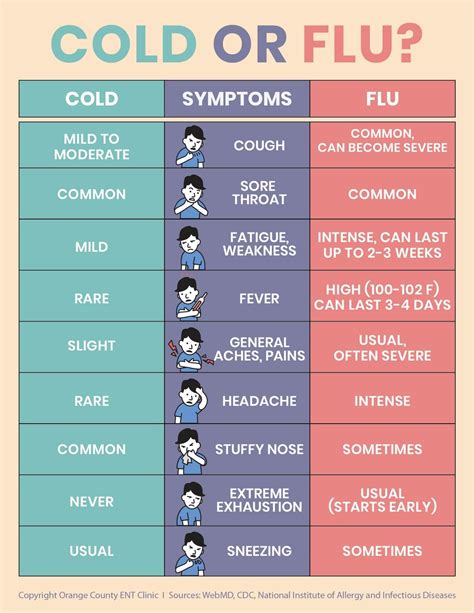
The symptoms of a cold can vary in severity and duration, but they often include:
- A runny nose or stuffy nose
- Sneezing and coughing
- Sore throat
- Headache and fatigue
- General feeling of being unwell
- Loss of appetite
- Muscle aches and pains
- Fever, especially in children
Treatment Options For A Cold
While there is no cure for the common cold, there are several treatment options available to alleviate symptoms and help the body recover. These include: * Over-the-counter medications, such as pain relievers and decongestants * Rest and hydration * Steam inhalation to relieve congestion * Saline nasal sprays to moisturize the nasal passages * Honey to soothe a sore throat * Chicken soup to help ease symptomsHow To Prevent A Cold
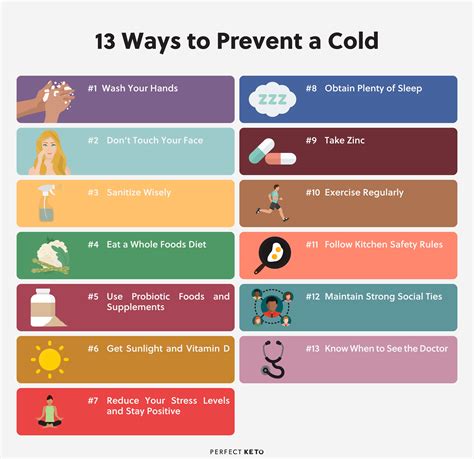
Preventing a cold can be challenging, but there are several steps that can be taken to reduce the risk of infection. These include:
- Practicing good hygiene, such as washing hands frequently and avoiding close contact with people who are sick
- Getting enough sleep and managing stress
- Eating a healthy diet rich in fruits, vegetables, and whole grains
- Staying hydrated by drinking plenty of fluids
- Avoiding exposure to allergens and irritants
- Getting regular exercise to boost the immune system
Complications Of A Cold
While a cold is often a mild illness, it can lead to more severe complications, especially in people with weakened immune systems. These complications may include: * Sinus infections * Ear infections * Bronchitis * Pneumonia * Asthma exacerbationsWhen To Seek Medical Attention
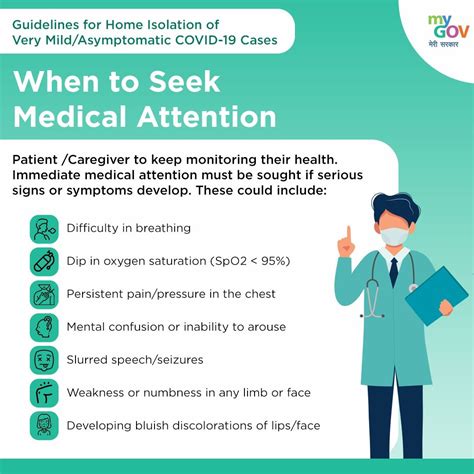
While a cold is often a self-limiting illness, there are times when it is essential to seek medical attention. These include:
- Severe symptoms, such as difficulty breathing or chest pain
- Fever over 102°F (39°C)
- Severe headache or stiff neck
- Confusion or disorientation
- Vomiting or diarrhea
- Signs of dehydration, such as excessive thirst or dark urine
Home Remedies For A Cold
There are several home remedies that can help alleviate symptoms of a cold. These include: * Drinking warm liquids, such as tea or broth * Using a humidifier to add moisture to the air * Practicing steam inhalation to relieve congestion * Using saline nasal sprays to moisturize the nasal passages * Taking over-the-counter medications, such as pain relievers and decongestantsCold Versus Flu
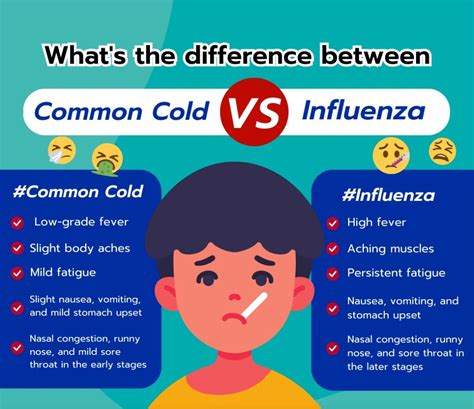
It can be challenging to distinguish between a cold and the flu, as both illnesses share similar symptoms. However, there are some key differences. The flu is often more severe and can cause:
- High fever
- Chills
- Body aches
- Fatigue
- Diarrhea and vomiting
Cold And Flu Prevention
Preventing a cold and the flu can be achieved by taking several steps, including: * Getting vaccinated against the flu * Practicing good hygiene, such as washing hands frequently and avoiding close contact with people who are sick * Getting enough sleep and managing stress * Eating a healthy diet rich in fruits, vegetables, and whole grains * Staying hydrated by drinking plenty of fluidsCold And Flu Treatment
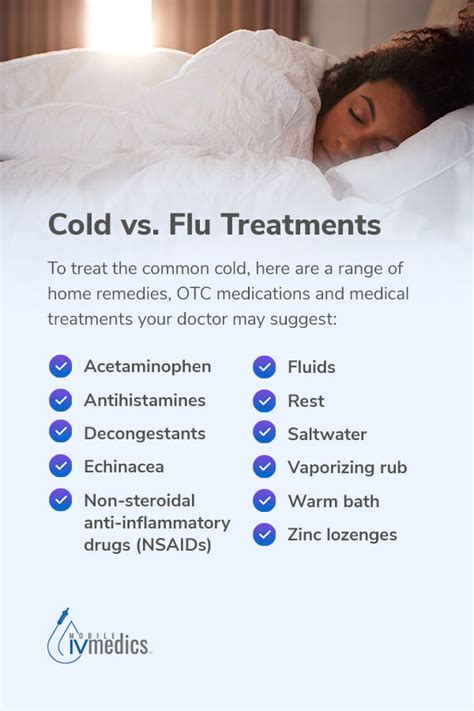
While there is no cure for the common cold, there are several treatment options available to alleviate symptoms and help the body recover. These include:
- Over-the-counter medications, such as pain relievers and decongestants
- Rest and hydration
- Steam inhalation to relieve congestion
- Saline nasal sprays to moisturize the nasal passages
- Honey to soothe a sore throat
- Chicken soup to help ease symptoms
Cold And Flu Medications
There are several over-the-counter medications available to treat cold and flu symptoms. These include: * Pain relievers, such as acetaminophen or ibuprofen * Decongestants, such as pseudoephedrine or phenylephrine * Cough suppressants, such as dextromethorphan * Expectorants, such as guaifenesin * Antihistamines, such as diphenhydramineWhat are the common signs of a cold?
+The common signs of a cold include a runny nose, congestion, sneezing, coughing, and a sore throat. Other symptoms may include a headache, fatigue, and a general feeling of being unwell.
How can I prevent a cold?
+Preventing a cold can be achieved by taking several steps, including practicing good hygiene, getting enough sleep, eating a healthy diet, staying hydrated, and avoiding exposure to allergens and irritants.
What is the difference between a cold and the flu?
+The flu is often more severe and can cause high fever, chills, body aches, fatigue, diarrhea, and vomiting. A cold, on the other hand, is often milder and may cause a runny nose, congestion, sneezing, coughing, and a sore throat.
How can I treat a cold?
+Treating a cold can be achieved by taking several steps, including getting plenty of rest, staying hydrated, using over-the-counter medications, such as pain relievers and decongestants, and practicing steam inhalation to relieve congestion.
When should I seek medical attention for a cold?
+Seeking medical attention for a cold is essential if you experience severe symptoms, such as difficulty breathing or chest pain, fever over 102°F (39°C), severe headache or stiff neck, confusion or disorientation, vomiting or diarrhea, or signs of dehydration.
In conclusion, the common cold is a viral infection that can cause a range of symptoms, from mild to severe. Recognizing the signs and symptoms of a cold is essential to seek proper treatment and prevent complications. By practicing good hygiene, getting enough sleep, eating a healthy diet, staying hydrated, and avoiding exposure to allergens and irritants, you can reduce the risk of infection. If you experience severe symptoms or have a weakened immune system, it is essential to seek medical attention to prevent complications. Remember to always consult with a healthcare professional for proper diagnosis and treatment. Share this article with your friends and family to help them understand the common signs of a cold and how to prevent and treat it. Leave a comment below to share your experiences with the common cold and how you manage its symptoms.
